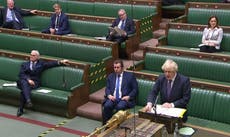Why does Boris Johnson always act too slowly and too late on coronavirus?
There’s a pattern of behaviour going back to last March. A fair summary of his approach is: ‘Don’t panic! Then do’

Your support helps us to tell the story
From reproductive rights to climate change to Big Tech, The Independent is on the ground when the story is developing. Whether it's investigating the financials of Elon Musk's pro-Trump PAC or producing our latest documentary, 'The A Word', which shines a light on the American women fighting for reproductive rights, we know how important it is to parse out the facts from the messaging.
At such a critical moment in US history, we need reporters on the ground. Your donation allows us to keep sending journalists to speak to both sides of the story.
The Independent is trusted by Americans across the entire political spectrum. And unlike many other quality news outlets, we choose not to lock Americans out of our reporting and analysis with paywalls. We believe quality journalism should be available to everyone, paid for by those who can afford it.
Your support makes all the difference.Why does Boris Johnson always act too slowly and too late on coronavirus? One theory doing the rounds at Westminster is that he wants to show the public – and lockdown sceptic Conservative MPs – he hates imposing restrictions and so delays them until the last moment.
With an EU trade deal approved by parliament, the prime minister no longer needs to worry about the noisy band of hardline Brexiteers in the European Research Group (ERG). But there’s now another tail trying to wag the Tory dog: the Covid Recovery Group, many of whose 80 members are also in the ERG.
Although 55 Tories rebelled over Covid restrictions last month, their response to England’s third national lockdown has been muted, given the undisputed threat from the new variant of the virus. When Johnson spoke to Tory backbenchers on Zoom last night, concerns were raised that the lockdown regulations will not expire until 31 March. He insisted they will be reviewed in mid-February. But most potential rebels will back the lockdown in today’s Commons vote.
His Tory critics are again grumbling about Johnson’s response to the pandemic after the latest shambles over school closures. Some moan about poor communications but this is the wrong target; you can communicate decisions, but not indecision. Scientific advisers warned Johnson before Christmas that it would be difficult to keep schools open. I’m told he intended to put the whole of England into the top tier 4 level of restrictions this week and allow schools to reopen. But he was forced to bow to the inevitable on Monday after receiving alarming new figures on Covid infections and a dramatic warning from the UK’s four chief medical officers that hospitals will soon be overwhelmed.
Johnson caused unnecessary anxiety for parents, children, heads and teachers by allowing most primary schools to return for just one day on Monday. Hardly the “decisive action” ministers claim the PM took.
There’s a pattern of behaviour going back to last March. The first lockdown was delayed by two weeks, with devastating consequences. Johnson put off the circuit breaker recommended by the scientists in September until November. He left it very late to “cancel Christmas” after clinging to his ill-judged five-day relaxation of the curbs until the last minute. Worryingly, Johnson shows little sign of learning from his mistakes; a fair summary of his approach is: “Don’t panic! Then do.” All from the PM who attacked parliament’s “prevarication, procrastination, dither and delay” over Brexit.
Johnson insists the government is “entirely reconciled to doing what it takes to get the virus down”. But it’s not doing so. Some of its own advisers want more financial help to encourage those on low incomes to self-isolate. A Public Health England study, slipped out last month, said “inability to self-isolate” is a factor in higher infection rates among the poorest families, adding, “supported isolation/quarantine and income relief could improve people’s ability to follow isolation guidelines.”
There are early signs that take-up of the mass testing pilot scheme in Liverpool was almost twice as high in the richest areas than the poorest. Parents and those not covered by statutory sick pay (SSP) felt they might be unable to isolate.
This is the gaping hole in the government’s strategy. Many people don’t qualify for the £500 one-off self-isolation payment, which covers only one in eight workers. SSP, at £95.85 a week (one of the lowest rates in Europe), should be increased and extended to people earning less than £120 a week. The current threshold means 2 million (mainly women) workers miss out.
The other way to tackle the problem would be to extend the furlough scheme to workers suffering from coronavirus or who self-isolate, so they receive 80 per cent of their wages, as the Resolution Foundation think tank has proposed. It would cost an estimated £314m a month, a relatively small addition to the £46bn furlough bill, and worth it to boost self-isolation rates.
The £500 payment should be extended to people who reduce their working hours when schools are shut – usually mothers, who were almost twice as likely to do so than fathers during the first lockdown. Such times are harder for women, who were also a third more likely to lose their job in the first shutdown than men.
A survey for the TUC found that 20 per cent of workers who were forced to self-isolate and are unable to work at home receive no sick pay or wages. “The lack of decent sick pay is undermining Britain’s public health effort and is forcing workers to choose between doing the right thing and being plunged into hardship,” said Frances O’Grady, the TUC general secretary.
If Johnson does the right and sensible thing, I promise not to call it another U-turn. Well, maybe.




Join our commenting forum
Join thought-provoking conversations, follow other Independent readers and see their replies
Comments